Key Takeaways:
Building a hotel booking app allows businesses to increase direct bookings, reduce third-party dependency, and boost revenue consistently.
Integrating AI personalization, predictive pricing, and smart recommendations enhances user experience and drives higher conversion rates effectively.
Essential features include real-time inventory, secure payments, ratings, reviews, push notifications, and intuitive search filters for travelers.
Understanding cost, app complexity, and phased development helps optimize budgeting while ensuring scalable and future-ready hotel booking apps.
Emerging trends like AR/VR tours, IoT smart rooms, and blockchain ensure innovation, trust, and competitive advantage in hospitality apps.
Partnering with JPLoft provides end-to-end expertise, seamless project execution, and continuous support for scalable, secure, and engaging apps.
Travelers today expect instant confirmations, real-time room availability, secure payments, and personalized recommendations, all from their smartphones.
This growing demand has encouraged businesses worldwide to build a hotel booking app that delivers convenience, speed, and smarter travel experiences.
So, how to build a hotel booking app?
Start by identifying your target audience and defining core features such as search functionality and secure payments.
Then, choose the right tech stack and partner with an experienced development team to turn your idea into a scalable solution.
With digital bookings dominating the hospitality sector, launching your own platform can unlock strong revenue potential and long-term growth.
In this guide, you’ll explore features, development steps, cost factors, monetization strategies, and emerging tech trends shaping the industry.
What is a Hotel Booking App?
A hotel booking app is a digital platform that lets travelers search, compare, and reserve hotel rooms instantly from their mobile devices or desktops.
These apps integrate real-time availability, dynamic pricing, secure payments, and guest reviews to deliver a seamless booking experience.
Users can filter stays by location, date, price, and amenities with ease. Modern hotel booking apps also personalize recommendations using AI in hospitality to match traveler preferences, boosting conversions and customer loyalty.
Built with responsive design and powerful backend systems, these apps empower hotels to manage inventory, promotions, and guest interactions efficiently.
They also help reduce dependency on third-party channels while improving direct bookings and operational control.
Key Data Insights & Stats (2026)
These are the key statistics highlighting the rapid digital transformation shaping the global hotel booking and mobile reservations landscape in 2026 and beyond.
-
Total revenue for the worldwide hotel market is projected to hit $492.36 billion in 2026. Continued growth at a CAGR of 6.71% is expected to drive this figure to $638.39 billion by 2030.
-
By 2030, an estimated 81% of all hotel revenue will be generated through online channels (up from approximately 65% in 2026), with mobile apps being the primary engine of this growth.
-
The mobile accommodation booking sector is projected to grow at a 12.65% CAGR through 2031, making apps the fastest-expanding platform in the travel industry.
-
In 2026, mobile booking revenue is forecasted to surpass desktop, driven by digital identity wallets and growing trust in booking luxury stays on small screens.
These data points show that mobile technology and evolving digital booking platforms are driving the hotel booking industry’s growth and reshaping traveler behavior year after year.
How Does a Hotel Booking App Work?
A hotel booking app connects travelers with hotel inventory in real time. It synchronizes search, pricing, availability, and payments through integrated APIs and backend systems.
-
User Search: Travelers enter destination, dates, and preferences to find available rooms instantly.
-
Real-Time Inventory Sync: The system connects with hotel databases and channel managers for live availability updates.
-
Smart Filtering: Users refine results by price, ratings, amenities, and location.
-
AI Personalization: Modern apps leverage AI in travel apps to recommend relevant stays based on behavior.
-
Secure Payments: Encrypted gateways process transactions safely and generate instant confirmations.
-
Admin Control Panel: Hotels manage pricing, bookings, and promotions from a centralized dashboard.
For businesses wondering how to develop a hotel booking app? They must ensure scalability, data security, and smooth third-party integrations for uninterrupted performance.
Benefits of Investing in a Hotel Booking App
Investing in a hotel booking platform helps businesses capture the rapidly growing digital travel market. It strengthens brand visibility, customer loyalty, and long-term revenue potential.
Here are the key benefits of investing in hotel booking app development:
1. Direct Revenue Growth
When you build a hotel booking app, you reduce dependency on third-party platforms and avoid high commission fees.
This increases profit margins while giving you full control over pricing strategies.
2. Enhanced Customer Experience
Personalized recommendations, seamless payments, and instant confirmations improve user satisfaction.
Businesses exploring how to develop a hotel booking app should prioritize speed, usability, and personalization to deliver faster service, boosting retention and repeat bookings significantly.
3. Stronger Brand Authority
A dedicated platform helps you create a hotel booking app that reflects your brand identity.
Custom features and loyalty programs strengthen trust and position you competitively in crowded markets.
4. Data-Driven Decision Making
Owning customer data enables smarter marketing campaigns and pricing adjustments.
Businesses that make a hotel booking app gain actionable insights to improve offers and optimize occupancy rates efficiently.
5. Competitive Market Advantage
Exploring innovative features inspired by top travel app ideas helps businesses differentiate effectively.
Advanced filters, AI personalization, and exclusive deals position your platform ahead of competitors.
6. Scalability and Expansion Opportunities
A scalable architecture supports multi-property listings and global expansion.
Partnering with professional app development teams ensures smooth upgrades, seamless third-party integrations, and future-ready adaptability.
All in all, investing strategically allows businesses to scale faster while strengthening direct customer relationships.
Features to Include in a Hotel Booking App
To build an app for booking hotels successfully, feature planning is critical. Studying top travel app features helps identify functionalities that drive engagement and conversions.
Below are the key features to include in hotel booking mobile app development:
► Advanced Search & Filters
A powerful search engine allows users to find hotels by location, date, price, ratings, and amenities.
Smart filtering improves discovery speed and enhances user satisfaction across diverse traveler preferences.
► Real-Time Availability & Pricing
Live synchronization with hotel databases ensures accurate room inventory and dynamic pricing.
Businesses that develop a hotel booking app must integrate APIs to prevent overbooking and pricing mismatches.
► Secure Payment Gateway
Encrypted payment systems protect transactions and support multiple payment methods.
To create a hotel booking app, integrating trusted gateways ensures compliance, user trust, and seamless global payments.
► User Profiles & Booking History
Personalized dashboards store traveler preferences, booking history, and loyalty rewards.
When you make a hotel booking app, offering tailored experiences improves retention and encourages repeat reservations.
► Ratings & Reviews System:
Verified reviews build credibility and influence booking decisions.
Effective hotel booking mobile app development includes transparent feedback mechanisms to enhance trust and drive higher conversion rates.
► Push Notifications & Alerts:
Automated alerts inform users about discounts, booking confirmations, and cancellations.
If you plan to build an on-demand hotel booking app, notifications improve engagement and boost time-sensitive bookings.
► Admin Dashboard & Analytics:
A centralized control panel manages inventory, pricing, promotions, and user data.
Proper hotel booking app development integrates analytics tools to support informed decision-making and revenue optimization.
In conclusion, the right feature set ensures scalability, engagement, and long-term profitability.
Step-by-Step Approach to Building a Hotel Booking App
To build a hotel booking app, you need a clear roadmap, defined goals, and scalable technology planning. A structured process minimizes risks and ensures long-term growth in competitive markets.
Following proven frameworks helps businesses avoid costly mistakes during hotel booking mobile app development.
Below are the steps to follow to build an app for booking hotels successfully.
Step 1: Market Research & Validation
Strong research defines your audience, competitors, and revenue opportunities before development begins. It reduces uncertainty and sets a clear product direction for scalable growth when you build a mobile app for the hospitality market.
► Define Target Audience
Understanding traveler personas helps align features with user expectations and booking behavior patterns.
Clear audience segmentation improves marketing efficiency and supports strategic decisions when you develop a hotel booking app successfully.
► Competitive Analysis
Analyzing leading apps reveals strengths, weaknesses, and monetization approaches in the hospitality market.
For businesses researching how to create a hotel booking app, this analysis provides valuable positioning insights and clear differentiation strategies.
► Validate Business Model
Assess revenue streams, partnerships, and operational feasibility before technical execution.
Early validation ensures sustainable profitability when you make a hotel booking app for competitive digital markets.
Step 2: Feature Planning & UX Strategy
Feature clarity ensures balanced functionality without overwhelming the end user. Strategic UX planning enhances engagement, retention, and seamless booking experiences.
► Define Core Features
Identify search filters, payments, notifications, booking management systems, and essential mobile app features to include in your hotel booking.
Prioritize the core functionalities required to build an on-demand hotel booking app that delivers seamless and intuitive user experiences.
► UX Wireframing
App wireframes map user journeys and screen transitions logically.
Businesses exploring how to design a travel app should prioritize simplicity, accessibility, and frictionless navigation across every interaction point.
► Prototype Testing
Early mobile app prototypes gather user feedback before full development begins.
This approach prevents costly redesigns and supports an optimized app aligned with market expectations.
Step 3: Choose the Right Technology
Technology decisions determine scalability, security, and performance standards. Choosing wisely impacts speed, integrations, and long-term adaptability.
► Select Development Approach
Choose native, hybrid, or cross-platform frameworks carefully, including top programming frameworks for app development like Flutter, React Native, and Swift.
The right architecture supports efficient app development while balancing performance, scalability, and long-term cost-effectiveness.
► Finalize Backend Architecture
Robust backend systems manage inventory, payments, and APIs efficiently.
Selecting an appropriate travel app tech stack ensures stability, real-time synchronization, and future scalability.
► Third-Party Integrations
Integrate payment gateways, maps, and analytics tools seamlessly.
These integrations strengthen reliability when you develop a hotel booking app for global audiences.
Step 4: Development & Integration
Execution transforms ideas into a functional booking platform. Agile development ensures iterative improvements and faster deployment, especially when partnering with a reliable mobile app development company in the USA experienced in scalable travel solutions.
► Frontend Development
Develop intuitive interfaces with responsive layouts and smooth navigation.
Clean frontend coding enhances usability when you create a hotel booking app targeting modern mobile users.
► Backend Development
Implement databases, APIs, and secure authentication layers.
Efficient backend programming ensures scalable on-demand hotel booking app development with consistent performance.
► API Synchronization
Enable real-time hotel inventory updates through API connections.
Accurate synchronization prevents double bookings and enhances trust during app development.
Step 5: Testing & Quality Assurance
Comprehensive mobile app testing prevents errors and improves reliability before launch. Quality checks protect user trust and safeguard revenue operations.
► Functional Testing
Validate search, booking, and payment flows thoroughly.
Following a structured travel app testing process ensures flawless functionality across devices and operating systems.
► Security Testing
Assess vulnerabilities, encryption protocols, and overall mobile app security measures carefully.
Strong security frameworks protect data and build confidence when you build a hotel booking app handling sensitive transactions.
► Performance Optimization
Test speed, load handling, and server stability under stress.
Optimization improves scalability and ensures smooth outcomes for businesses exploring how to create an on-demand hotel booking app.
Step 6: Launch & Continuous Improvement
Launching marks the beginning of growth and optimization cycles. Post-launch strategies determine sustainability and competitive strength.
► Deployment Strategy
Release the app across app stores with proper compliance.
Businesses researching how to create a travel app should prioritize optimized listings and user onboarding experiences.
► Marketing & Promotion
Leverage digital campaigns, partnerships, and SEO for visibility.
Strong promotion enhances adoption when you make a hotel booking app targeting competitive travel markets.
► Ongoing Updates
Monitor analytics, collect feedback, and release updates consistently with reliable app maintenance services.
Continuous improvements strengthen performance and meet evolving demands in app operations.
In conclusion, a structured approach ensures scalability, security, and long-term profitability when planning how to create an on-demand hotel booking app successfully.
What’s the Cost to Make a Hotel Booking App?
The hotel booking app development cost typically ranges between $10K to $200K+, depending on complexity and feature depth.
Budget planning depends on design requirements, supported platforms, integrations, and backend infrastructure.
Businesses investing in hotel booking mobile app development must evaluate long-term scalability before finalizing the technical scope.
Feature customization, API integrations, and real-time booking engines significantly impact pricing.
The cost to develop a travel app also varies based on UI sophistication and data management architecture.
Apps with AI-driven personalization and multilingual support naturally require higher development budgets.
Security compliance and payment gateway integrations further influence total expenditure.
Estimated Cost Breakdown by Component:
|
Component |
Estimated Cost Range |
|
UI/UX Design |
$5,000 – $20,000 |
|
Frontend Development |
$10,000 – $40,000 |
|
Backend Development |
$15,000 – $60,000 |
|
API & Integrations |
$5,000 – $25,000 |
|
Testing & QA |
$5,000 – $20,000 |
|
Maintenance (Annual) |
15–20% of total cost |
Cost Based on App Complexity:
A basic MVP costs between $10,000 – $30,000 and includes core booking functionality only.
Mid-level apps range from $30,000 – $80,000 with analytics, notifications, and loyalty programs integrated.
Enterprise-level platforms cost $80,000 – $200,000+ supporting multi-property listings and AI-powered engines.
|
App Complexity |
Price Range |
|
Basic MVP |
$10K – $30K |
|
Mid-Level App |
$30K – $80K |
|
Enterprise App |
$80K – $200K+ |
Understanding the cost to make a hotel booking app ensures smarter budgeting and sustainable growth.
In conclusion, clear planning for the cost to build a mobile app reduces financial risks while supporting scalable digital expansion.
Top Hotel Booking Apps
Studying leading platforms helps businesses understand market expectations and innovation standards. Many of the best travel apps set benchmarks for user experience and scalability.
These are the top hotel booking apps shaping the global hospitality industry:
1. Booking.com
Booking.com, often recognized as one of the best hotel booking app platforms globally, dominates hotel reservations with extensive property listings and multilingual support worldwide. Its powerful search filters and loyalty program drive repeat usage.
Businesses aiming to develop a hotel booking app like Booking.com must prioritize scalability, personalization, and seamless booking experiences.
2. Airbnb
Airbnb revolutionized hospitality by connecting travelers directly with hosts across diverse property categories. Its intuitive interface and secure payment systems enhance trust.
Founders seeking to make an app like Airbnb can learn from its community-driven review ecosystem.
3. Agoda
Agoda offers competitive pricing and a strong presence across Asia-Pacific travel markets. Its mobile-first design enhances user convenience and last-minute bookings.
Businesses investing in hotel booking mobile app development often benchmark against Agoda’s localized pricing strategies and evaluate the cost to create an app like Agoda.
4. Expedia
Expedia integrates hotels, flights, and packages within a unified platform experience. Its bundled offerings increase average booking value.
Companies planning to develop an app like Expedia can study its cross-selling and loyalty-driven monetization model.
5. Hopper
Hopper uses predictive analytics to forecast hotel and flight prices accurately. Its AI-driven notifications encourage users to book at optimal times.
Entrepreneurs researching how to create an app like Hopper should focus on data intelligence and automation.
Analyzing competitors positioned as the best hotel booking app in global markets provides valuable strategic insights. These insights help businesses create platforms with strong differentiation and scalable growth potential.
Top Challenges in Hotel Booking App Development and How to Solve Them
Building scalable platforms requires careful planning, strong architecture, and strategic execution.
Understanding travel app development challenges helps businesses avoid costly delays and performance failures.
These are the key challenges and practical solutions businesses must address to ensure successful hotel booking app development:
Challenge 1: Real-Time Data Synchronization Issues
Maintaining real-time synchronization between hotel inventory systems and the application backend is complex.
Delays or API failures can cause overbookings, incorrect pricing displays, and customer dissatisfaction, impacting credibility significantly.
Solution:
Use reliable APIs, automated data validation mechanisms, and failover systems to ensure accuracy.
When you develop a hotel booking app, integrate redundant servers and real-time monitoring tools for uninterrupted synchronization performance.
Challenge 2: Security and Data Privacy Risks
Handling sensitive user data, payment credentials, and booking details increases cybersecurity risks.
Weak encryption or compliance gaps can lead to data breaches, financial losses, and irreversible brand reputation damage.
Solution:
Implement end-to-end encryption, secure authentication layers, and compliance with global data protection standards.
Businesses must conduct regular penetration testing and vulnerability assessments to ensure robust security and data protection.
Challenge 3: Scalability During Peak Traffic
High traffic during holiday seasons can overload servers and slow performance.
Poor scalability planning affects booking speed, causes crashes, and results in abandoned transactions, reducing overall revenue potential significantly.
Solution:
Adopt cloud infrastructure with auto-scaling capabilities and load-balancing mechanisms.
If you are exploring how to make a hotel booking app, ensure performance optimization and stress testing before public launch.
Challenge 4: Complex Third-Party Integrations
Integrating payment gateways, maps, analytics tools, and hotel databases requires technical precision.
Compatibility issues or unstable APIs can disrupt operations and delay development timelines substantially.
Solution:
Select reliable integration partners and maintain clear API documentation.
Professional teams use modular architecture, and many businesses hire dedicated developers to ensure seamless integrations, faster issue resolution, and long-term platform stability.
Challenge 5: User Retention and Engagement
Acquiring users is easier than retaining them in competitive markets.
Lack of personalization and weak engagement features reduce repeat bookings and lifetime customer value significantly.
Solution:
Leverage AI-driven personalization, loyalty programs, and push notifications.
Businesses exploring how to create a hotel booking app should continuously analyze user behavior and refine engagement strategies accordingly.
Addressing technical and operational risks early ensures smoother deployment and long-term scalability.
How Hotel Booking Apps Make Money?
Revenue generation is critical for sustainable digital growth in hospitality markets. Understanding travel app monetization strategies helps founders design profitable booking ecosystems.
Below are the key revenue models used in hotel booking app development:
1. Commission on Bookings
Hotel booking platforms earn commission by charging hotels a percentage on every confirmed reservation processed through the app.
Businesses that build a hotel booking app commonly adopt this scalable performance-based revenue model.
2. Service Fees from Users
Apps charge travelers a small service fee during checkout for booking facilitation and customer support services.
Companies exploring how to make a hotel booking app use this approach to generate predictable transaction-based income.
3. Featured Listings and Promotions
Hotels pay additional fees to appear in sponsored search results or highlighted placements within the app.
When you create a hotel booking app, premium visibility packages can significantly increase advertising revenue streams.
4. Subscription Plans for Hotels
Some platforms offer subscription models allowing hotels unlimited listings and advanced analytics access.
Businesses leveraging subscriptions can maintain recurring and stable revenue inflows while enhancing platform value.
5. Dynamic Pricing and AI Upselling
AI-driven recommendations promote room upgrades, add-ons, and personalized packages during checkout.
Companies that make a hotel booking app increase average booking value through intelligent cross-selling and targeted upselling strategies.
6. Affiliate Partnerships
Apps partner with airlines, car rentals, and travel insurers to earn affiliate commissions.
Strategic collaborations enhance ecosystem value while strengthening overall app monetization potential.
Diversified revenue streams ensure sustainable profitability and scalable business growth.
Future Trends in Developing a Hotel Booking App
The hospitality industry is rapidly evolving with intelligent automation and immersive digital experiences.
Staying aligned with travel app development trends ensures long-term competitiveness and innovation.
These are the key trends shaping the future of hotel booking platforms:
1. AI-Powered Personalization
AI-driven recommendation engines analyze user preferences, search behavior, and booking history to suggest relevant stays.
Businesses building an AI hotel booking app often collaborate with an experienced AI development company to enhance engagement, improve conversions, and deliver hyper-personalized traveler experiences.
2. Voice Search and Smart Assistants
Voice-enabled booking allows travelers to search hotels and confirm reservations using conversational commands.
Integrating intelligent assistants strengthens accessibility when you develop a platform targeting convenience-driven modern users.
3. AR/VR-Based Virtual Hotel Tours
Virtual reality and AR in travel apps allow users to explore rooms before making booking decisions.
Immersive previews reduce uncertainty, increase trust, and improve booking confidence across global travel markets.
4. IoT-Enabled Smart Stays
IoT integration connects hotel rooms with smart devices controlling lighting, temperature, and security.
Businesses can integrate smart room preferences within booking profiles to enhance the guest experience.
5. Predictive Pricing & Dynamic Optimization
Machine learning models forecast demand fluctuations and recommend optimal pricing strategies.
Predictive analytics enhances profitability and strengthens competitive positioning in evolving hospitality ecosystems.
6. Blockchain for Secure Transactions
Blockchain enhances transparency, prevents fraud, and secures digital payments, especially when implemented by an experienced blockchain development company.
Decentralized verification builds trust and protects sensitive booking data across international transactions.
Embracing emerging technologies ensures sustainable innovation and long-term leadership in digital hospitality markets.
Why Partner with JPLoft To Build Your Hotel Booking App?
Building a successful hotel booking app requires technical expertise, industry knowledge, and scalable solutions.
JPLoft is a trusted travel app development company delivering end-to-end solutions for modern hospitality platforms.
Our team specializes in hotel booking mobile app development, integrating AI, secure payment gateways, and personalized user experiences.
We follow a structured development process, ensuring timely delivery, quality assurance, and cost-efficient solutions.
Partnering with JPLoft gives access to experienced designers, developers, and project managers who understand market trends and user expectations.
We also offer post-launch support, regular updates, and maintenance to ensure continuous app performance.
From MVP to enterprise-level platforms, JPLoft provides scalable solutions tailored to your business goals.
With our expertise, you can launch a feature-rich, secure, and competitive hotel booking app that maximizes bookings and revenue.
Choose JPLoft to transform your hospitality vision into a robust, future-ready digital platform.
Conclusion
The hospitality industry is rapidly shifting toward digital platforms, making it essential for businesses to build a hotel booking app that delivers seamless, personalized experiences.
Modern travelers expect instant bookings, real-time availability, and AI-driven recommendations.
Investing in hotel booking mobile app development allows businesses to reduce third-party dependency, capture direct revenue, and enhance customer loyalty.
From essential features like search filters, secure payments, and reviews to advanced AI personalization and AR/VR experiences, the right app can transform guest interactions.
A well-planned development strategy, scalable architecture, and continuous updates ensure long-term growth and competitive advantage.
By leveraging emerging technologies and best practices, businesses can maximize engagement, boost conversions, and thrive in the evolving hospitality landscape.
Building a feature-rich, secure, and scalable hotel booking app is no longer optional; it’s a strategic necessity.
FAQs
The cost ranges from $10K to $200K+, depending on features, platform support, integrations, and AI personalization for a scalable and robust app.
Development typically takes 4–6 months for an MVP and up to 9–12 months for enterprise-level apps, including design, development, testing, and integration.
Start with market research and feature planning, followed by UI/UX design, backend development, API integrations, testing, and deployment to ensure a secure and scalable platform.
Revenue comes from commissions, service fees, featured listings, subscription plans, AI upselling, and affiliate partnerships, making monetization highly scalable for modern hotel booking platforms.
Key technologies include secure payment gateways, APIs for real-time inventory, AI engines for personalization, AR/VR for virtual tours, and cloud-based infrastructure for scalability and performance.





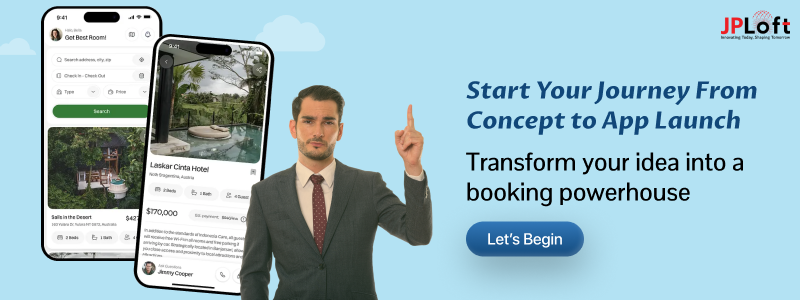
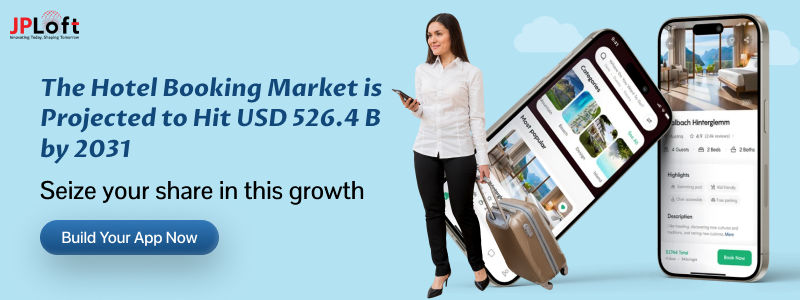

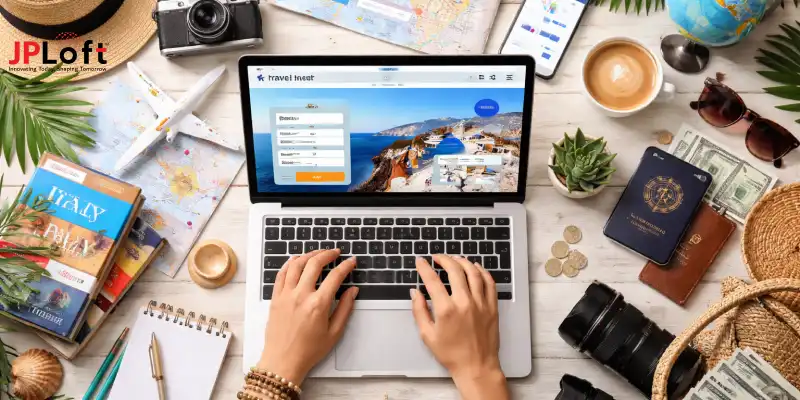
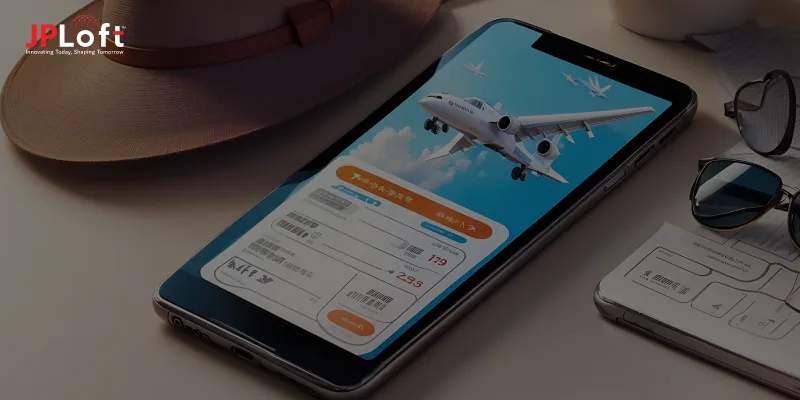
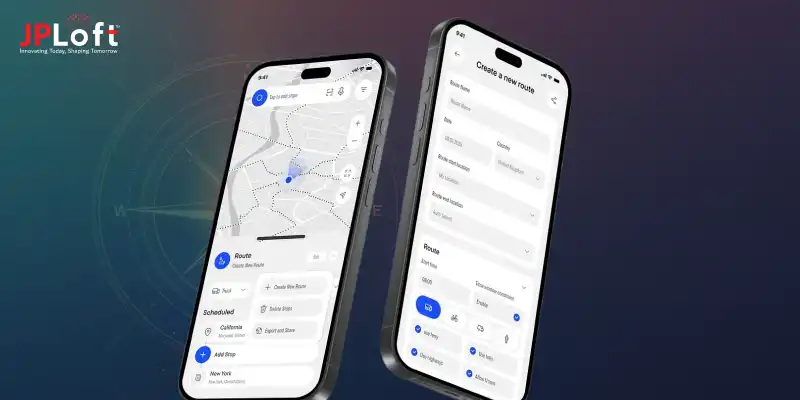


Share this blog